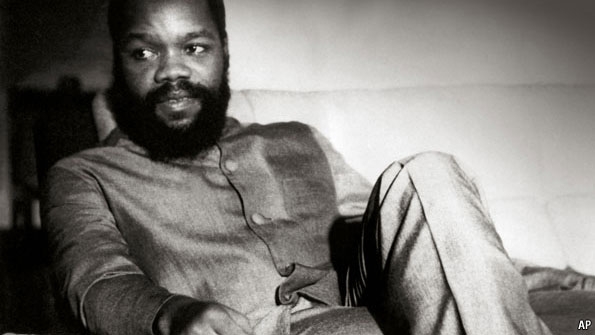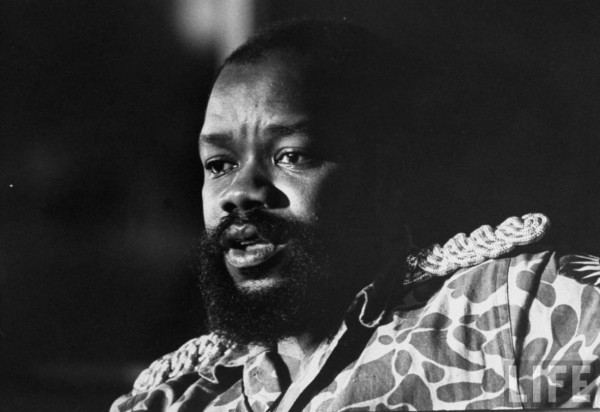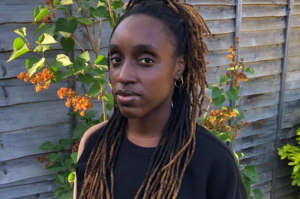The late ’50s to early ’60s were exciting times in Nigeria. Chinua Achebe had just published Things Fall Apart. Wole Soyinka was back from Leeds and beginning to dazzle people with his playwriting skills. Fela Kuti was laying the ground work for what will become Afrobeat. A few years before, Tai Solarin had built May Flower School and was already spreading his gospel of educational innovation.
C. Odumegwu Ojukwu, the leader of Biafra—the breakaway nation that sparked a civil war in Nigeria during late ’60s— was part of this creative and intellectual scene. He studied history in Oxford University and was expected to get a job in civil service and live the dream of colonial middle class life. He tried it, hated it, and went into the army. Those days, people who had degrees, especially from Oxford, just did not go into the army. Ojukwo was one of the first who did.
He wrote a lot during the Biafra war. Many of his notes and speeches are collected in a volume titled Biafra: Selected Speeches and Random Thoughts. My indifference to Ojukwu and his generation of leaders changed when I started reading this collection—a work I highly recommend.
The collection contains detailed documentation of events leading up to the war, in addition to meditations on violence and revolutions, leadership and the nation, race and oppression, and his sense of Biafra as an innovative political idea.
It’s sad, but Nigerians have become so disillusioned and cynical that they forget that there is so much in their past—a rich archive of people and ideas—from which they could draw inspiration. Nigeria has had some truly inspiring leaders its past. They were not perfect by any means, but they were thinkers, writers, and charismatic public speakers.
Ojukwu was one of them, as you’ll find in the quotes below.
1. The history of the world is a chronicle of oppression.
2. Since oppression is maintained by force, it is only possible to remove that oppression by a counterforce.
3. The illegal regime in Lagos under Gowon has accused Biafra of playing politics with her people’s misery. Our answer is simple: “We do not play politics. We are not masochists; rather, we are a people who choose to hunger a little to remain alive instead of feeding fat to become respectable corpses.”
4. We do not ask for pity. We make no apologies for the social phenomenon known as the Biafran revolution; rather, we proclaim with pride the inevitability of our struggle, the indestructability of our people, and the assured finality of our success.
5. Biafra is a child of circumstance…His existence and survival are always a marvel, sometimes bordering on a miracle. His life is a tribute to man, his courage is his endurance, his ingenuity is his humanity.
6. For unity to be meaningful it has to be creative, not the unity of Jonah in the whale but the unity of holy matrimony. The first can only lead to defecation, the second to procreation.

7. If a leader accepts himself as already dead to society, there will be no reason for cowardice in his leadership. One thing that frightens leaders and lead them to a number of excesses is usually fear of death. No leader should fear death. In fact, you should accept the fact that from the moment of leadership you are sacrificed to death. Each subsequent day becomes a bonus for the preparation of one’s memorial.
8. What I have become, in this struggle is the mouthpiece of my people. I go where they push and no more. The day I think otherwise, the day I act otherwise, that day my people, without compromising the struggle, will find another person to express their aspirations.
9. We are humans. We live. We fight, fight because the decision to be free is a decision taken freely and collectively, because to become involved in violent struggle for freedom is the only honor left to an oppressed people threatened with genocide, because in the final analysis the only true bulwark against death is to live. Biafra rejects death…Biafra lives.
Images via The Economist










Okocha Uka May 19, 2022 13:35
Have we learn any lesson from our past experiences? The answer is none both from our leaders and those being led. It does appear that we are not compatible as a people in a united entity ,as the bitterness and hatred of the Northers against the Easth continues to play out with the distruction of lives and properties at slightest provocation or some times unprovoc. Let us avoid a reapit of this history please by toeing the part of reasoning. Live and let live.